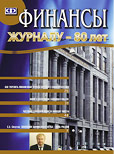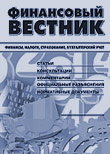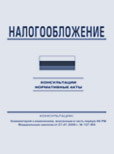Содержание
Актуально
E-mail: finance-journal@mail.ru
По материалам пресс-конференции Президента РФ
В.В. Путина 14 декабря 2017 года.
Финансы и бюджет: проблемы и решения
Т.Г. Кадникова, к.э.н., доцент кафедры экономики, бухгалтерского учета, анализа, аудита и финансов Петрозаводского ГУ
E-mail: goldsun@mail.ru
Т.А. Бокова, к.п.н., доцент кафедры экономики и финансов Карельского филиал РАНХиГС при Президенте Российской Федерации
E-mail: tbokova4@mail.ru
В статье анализируются промежуточные итоги Программы поддержки местных инициатив как практики инициативного бюджетирования в Республике Карелия. Исследован механизм финансового обеспечения реализации. Изучена структура и динамика финансирования местных инициатив в Республике Карелия. На основе анализа данных о реализации программы за период с 2014 по 2017 гг. сформулированы основные проблемы ее функционирования. В проекции выделенных проблем предложены пути их решения.
Ключевые слова: инициативное бюджетирование, программа поддержки местных инициатив, микро-проектное финансирование.
А.Х. Цакаев, профессор, д.э.н., профессор кафедры «Финансы и кредит» Чеченского ГУ, профессор кафедры «Экономика и финансы» РАНХиГС при Президенте РФ
E-mail: tsakaev@inbox.ru
У.А.-А. Рассуханов, к.э.н, руководитель УФК по Чеченской Республике, доцент кафедры «Экономика и управление на предприятии» Грозненского государственного нефтяного технического университета им. академика М.Д. Миллионщикова
E-mail: usmanrassuhanov@inbox.ru
В статье представлены результаты исследования вопросов регионального налогового потенциала, включая выявление факторов его роста, авторскую оценку и анализ регионального налогового потенциала, по данным конкретного субъекта РФ. Рассмотрен методический аппарат формирования и роста налогового потенциала Чеченской Республики, субъекта РФ с высоким уровнем финансовой помощи из федерального бюджета. Предложен механизм выделения инвестиций в основной капитал на основе регулирования роста налогового потенциала субъекта РФ.
Ключевые слова: инвестиции, риск, налоговый потенциал, налоговая база, налоги, целевая функция, критерий, рискообразующий фактор, риск-менеджмент.
Т.И. Барашева, к.э.н., доцент, ведущий научный сотрудник Института экономических проблем им. Г.П. Лузина Кольского НЦ РАН
E-mail: barasheva@iep.kolasc.net.ru
В статье исследуется опыт органов власти Мурманской области по реализации мероприятий, направленных на пополнение доходной части консолидированного бюджета. Наибольшие бюджетные эффекты обеспечиваются в ходе поддержки предприятий, реализующих инвестиционные проекты. В качестве перспективного направления в целях укрепления финансовой базы региона определяется активизация экономического роста посредством стимулирования: инвестиционной деятельности, импортозамещения, развития производств местных товаропроизводителей и субъектов малого и среднего предпринимательства.
Ключевые слова: доходы бюджета, деятельность органов власти, бюджетные эффекты.
Казначейство: становление и развитие
А.Ю. Демидов, заместитель руководителя Казначейства России, доктор экономических наук, заслуженный экономист Российской Федерации
E-mail: omogilyova@roskazna.ru
Прежде чем начать рассмотрение заявленной темы статьи, автор изложил читателю позицию относительно подходов к пониманию термина «бюджетный менеджмент». В интересах данной работы для обозначения управления в бюджетном секторе он использует термин бюджетный менеджмент и анализирует все процессы, которые входят в это понятие, их развитие в зависимости от поставленных задач и конкретной ситуации.
Ключевые слова: участники бюджетного процесса, документальный контроль, квазибюджетные средства, казначейское сопровождение, прозрачность расчетов.
И.С. Тапсиев, руководитель УФК по Ставропольскому краю, кандидат технических наук, доцент
С.А. Бабушкина, начальник отдела расходов УФК по Ставропольскому краю
E-mail: vetlana31@gmail.com
В статье рассматривается развития финансового контроля в Федеральном казначействе – от предварительного и текущего, которыми ведомство было наделено с момента своего зарождения, до последующего, который раньше осуществляли органы Росфиннадзора, а с 2016 г. эта функция переданы Казначейству России.
Ключевые слова: лимит бюджетных обязательств, контроль, код бюджетной классификации.
Налоги: теория и практика
Г.Я. Шахова, доктор экономических наук, доцент
Е-mail: g1shahova@yandex.ru
В статье освещается роль международной налоговой конкуренции в экономике. Особое внимание уделяется анализу факторов международной конкурентоспособности налоговой системы. Даются предложения по модернизации российской практики налогообложения.
Ключевые слова: международная налоговая конкуренция, международная конкурентоспособность налоговой системы, налоговая нагрузка, прямые налоги, косвенные налоги.
E-mail: Finvestnik@mail.ru
Обзор итогов XIII Всероссийского налогового форума, организованного ТПП в конце ноября 2017 года.
Излагаются тезисы выступления на мероприятии руководителя ФНС М.В. Мишустина, посвященного ККТ и другим IT-технологиям в налоговой сфере. Большое внимание уделено обзору практики применения новой статьи Налогового кодекса, посвященной порядку исчисления налоговой базы и суммы налога (ст. 54.1). Прослеживается взаимосвязь данной новации с постановлением пленума Высшего арбитражного суда 2006 г. Рассматриваются случаи, при которых уменьшение налоговой базы признается или не признается основательным и законным. Зам. руководителя ФНС С.А. Аракелов предложил свою трактовку, а представители бизнеса (налогоплательщики) высказали свои замечания и соображения. Дискуссии прошли в русле диалога.
Ключевые слова: статья 54.1, налоговая выгода, уменьшение налоговой базы, судебная практика, трактовка закона, IT-технологии.
Страхование
А.В. Завражский, андеррайтер департамента страхования финансовых рисков и ответственности АО АльфаСтрахование, аспирант кафедры банков, финансовых рынков и страхования СПГЭУ
E-mail: zavragsky@mail.ru
Статья посвящена оценке стоимости жизни человека в современной России применительно к существующей системе возмещения вреда. Рассмотрены основные трудности, препятствующие формированию справедливой оценки. Проанализированы основные научные подходы к стоимостной оценке жизни, определены их преимущества и недостатки. Как пишет автор, в законодательство до сих пор не прописана методика определения размера компенсации пострадавшим. Проведенный обзор судебной практики взыскания возмещения вреда жизни показывает ее разобщенность. Авторским вкладом следует считать предложенную им систему оценки стоимости жизни на основе базовой стоимости исходя из номинальной реальной заработной платы в стране с применением поправочных коэффициентов.
Ключевые слова: стоимость человеческой жизни, моральный вред, страхование, здравоохранение, возмещение вреда, рисковая грамотность, государственные компенсации.
Т.А. Верезубова, профессор УО (Учреждение образования) «Белорусский государственный экономический университет», кафедра налогов и налогообложения, доктор экономических наук
E-mail: verezubova@mail.ru
Автор оценивает потенциал роста и основные параметры белорусского страхового рынка с точки зрения международных сопоставлений, отмечая отставание местного страхового бизнеса. Вместе с тем она отмечает молодость рынка, такие позитивные процессы как укрупнение страховых организаций, постепенное наращивание финансовых ресурсов. Не вписывается в современный мировой контекст запрет частным СК заниматься обязательными видами страхования. В системе госрегулирования и контроля недостаточное место занимают экономические меры. Авто предлагает ряд шагов по стимулированию роста страхового рынка и модернизации системы надзора.
Ключевые слова: страхование, непредвиденные потери экономики, доля государства, показатели участников рынка, административные методы регулирования.
Финансовые рынки
Б.М. Ческидов, действительный член Академии военных наук, доктор экономических наук
E-mail: state2017@icloud.com
В статье анализируется генезис современной макроэкономической ситуации, приведшей к необходимости поддержки государством финансового сектора и в особенности коммерческих банков и сущность механизмов такой поддержки. Устанавливается связь между масштабными социальными, политическими, экономическими, технологическими сдвигами, наблюдаемыми с начала 80-х гг. ХХ в. и возрастанием значимости операций с производными ценностями и валютой, в т.ч. для коммерческих банков, а также неизбежность перехода, как результат этих процессов, к мягкой денежной политике и государственной поддержке стабильности коммерческих банков наряду с усилением регулирования деятельности последних.
Ключевые слова: коммерческие банки, финансовый рынок, реальный сектор экономики, государственное регулирование и поддержка, прогнозно-планирующий механизм, технологический прогресс, программа количественного смягчения, монетарная политика.
Annotation
E-mail: finance-journal@mail.ru
Editorial notes bout traditional annual open press-conference of the President Vladimir Putin that took place 14 December 2017.
Keywords: remission of debts, stable tax burden, perfection of tax system, indebtedness of individual entrepreneurs, taxpayers legitimate interests.
T.G. Kadnikova, candidate of economic sciences, assistant professor at department of economics, accounting, analysis, audit and finance of Petrozavodsk State University
E-mail: goldsun@mail.ru
T.A. Bokova, candidate of pedagogic sciences, assistant professor at economics and finance department of the Karelia branch of Russian Presidential Academy of National Economy and Public Administration
E-mail: tbokova4@mail.ru
The article contains analysis of interim results of implementation of local initiatives support program as incentive-based budgeting practice in Karelia republic. Authors explored relevant mechanisms of financial support for such programs. They describe structure and dynamics of local initiatives. Main problems revealed over the period from 2014 to 2017 and solutions offered.
Keywords: incentive-based budgeting, local initiatives, support program, microproject financing.
A.H. Tsakaev, full professor, doctor of economic sciences, professor at finance and credit department of Chechen State University, professor at economics and finance of Russian Presidential Academy of national economy and public administration
E-mail: tsakaev@inbox.ru
U.A.-A. Rassuhanov, candidate of economic sciences, head of Chechen Republic branch of Federal Treasury, assistant professor at economics and company management department of Grozny state oil technical university named after acad. M.D. Millionshchikov
E-mail: usmanrassuhanov@inbox.ru
The article presents the results of a study of the regional tax potential, including the identification of factors of its growth, the author's assessment and analysis of regional tax potential in one particular subject of the Russian Federation. The methodical device for formation and growth of the tax potential of the Chechen Republic, as a subject of the Russian Federation with a high level of dependence from financial assistance funded by the Federal budget is considered. The article outlines innovative mechanism of allocation of investments into fixed capital on the basis of regulation of growth of tax potential.
Keywords: investment, risk, tax potential, tax base, taxes, objective function, criterion, risk factor, risk management.
T.I. Barasheva, candidate of economic sciences, leading researcher at Institute of economic problems at Kolski research center of the Russian Academy of sciences
E-mail: barasheva@iep.kolasc.net.ru
The article sums up the experience accumulated by Murmansk region authorities in consolidation and increasing of budget revenues. The most effective measure is support for enterprises that are successfully implementing investment projects. Promising direction for strengthening the financial basis of the region is activation of economic growth through stimulation of investment activity, import substitution, development of local manufacturers, especially small and medium-sized enterprises.
Keywords: fiscal revenues, authorities, activity, budgetary effects.
A.U. Demidov, deputy head of Russian Federal Treasury, doctor of economic sciences, honored economist of the Russian Federation
E-mail:omogilyova@roskazna.ru
A.U. Demidov explains in detail his own interpretation of the term “budget management”. This term covers different processes and the author enunciates how all of them are evolving depending on the character of tasks set and specific situation.
Keywords: budget process, participants, documentary audit, quasi-budget funds, treasury supervision, transparency of payments.
I.S. Tapsiev, head of the Federal treasury branch of Stavropol region, candidate of technical sciences, assistant professor
E-mail: tsakaev@inbox.ru
S.A. Babushkina, head of disbursements department of the Stavropol regional branch
E-mail:svetlana31@gmail.com
The article is about development of the fiscal control exercised by the Federal Treasury — starting with preliminary and current control at the very beginning, up to the consecutive one that at the previous stage was entrusted earlier to Rosfinnadzor (Federal financial and Budgetary Supervisory Service, later dissolved). Since 2016 this function was assigned to and performed by the Russian Federal Treasury.
Keywords: limit of the budget commitments, control, budget classification code.
G.Ya. Shakhova, doctor of economic sciences, assistant professor
Е-mail: g1shahova@yandex.ru
The article highlights the growing role of international tax competition in the economic sphere. Particular attention is paid to the analysis of factors influencing the degree of international competitiveness of the national tax system. The author frames proposals aimed at modernization of Russian taxation practice.
Keywords: international tax competition, competitive advantages of tax system, tax burden, direct taxes, indirect taxes.
E-mail: Finvestnik@mail.ru
The review of 13th All-Russian Tax Forum conducted by Russian Trade and industry chamber ( the end of November 2017). The material contains head-notes of the presentation made by the head of Federal tax service M.V. Mishustin, who spoke at the session that was dedicated to IT in the sphere of taxation. Central issue discussed at the Congress was the implementation of the new article of the Tax Code that defines the order of calculation of tax base and tax amount (art. 54.1). The editorial observer traces the link between this novelty and the order of Supreme arbitration court issued in 2006 (and codified by now - incorporated into the new law). Which cases of reduction of tax base are to be considered as legitimate and which are not. Deputy head of the Federal tax service S.A. Arakelov spoke about FTS interpretation whereas business representatives - speakers at the event – expressed their understanding when reading the new law. Discussions were fruitful and held in a form of dialog.
Keywords: article 54.1, tax benefit, taxable income, reduction of tax obligations, allowable tax benefit, legal precedents, Higher arbitration court ruling, codification.
А.М. Zavrazhskiy, AlphaStrakhovanie (insurance company) underwriter, post graduate student of the Department of banks, financial markets and insurance, St-Petersburg State University of Economics
E-mail:zavragsky@mail.ru
The article is devoted to the problem of fair estimation of the cost of human life in modern Russia in relation to the existing system of compensation for harm. The author considers the main difficulties that prevent the formation of a fair and sufficient assessment of human life in practical terms. The most promising areas of application of such a valuation system have been established by author and the main requirements for its successful implementation formulated. The author analyzes the main scientific approaches to the valuation of life, their advantages and disadvantages. Review of the existing legislative base in Russia prompted the conclusion that there exists no complete and logical methodology for compensating the victims. The review of the judicial practice of charging compensation for the harm to life shows its contrariety and inconsistency. А.М. Zavrazhskiy personal contribution to the search of proper solution is the system for assessing the cost of live linked to base value, nominal real wages in the country with the application of correction factors.
Keywords: cost of human life, moral harm, insurance, healthcare, compensation for harm, risk literacy, government compensation.
T.A. Verezubova, professor at Belarus state economic university, department of tax and taxation, doctor of economic sciences
E-mail: verezubova@mail.ru
The author evaluates the growth potential and basic parameters of the Belorussian insurance market. From the standpoint of international comparisons she notes lagging behind of the local insurance business. However the market is still young and is driven by positive processes as enlargement of insurance organizations and gradual buildup of financial resources. Still the legislative ban to conduct classes of obligatory insurance for private insurance companies doesn’t fit into modern world context. The system of state regulation and control prevailing in the Republic does not rely on economic measures. The author suggests several solutions for stimulation of growth of the insurance market and modernization of supervision system.
Keywords: insurance, economy, contingent losses, public share, figures of market actors, administrative regulation methods.
B.M. Cheskidov, full member of the Academy of Military Sciences, doctor of economic sciences
E-mail:state2017@icloud.com
The article is about genesis of the modern macroeconomic situation in Russia. Why the financial sector and in particular commercial banks need the support of Government and what mechanisms of rendering such a support can be utilized. Connection between the large-scale social, political, economic, technological shifts observed since the beginning of the 80th and increasing importance of operations with derivative values and currency. Against this background transition to the soft monetary policy is presented as inevitable coupled with strengthening the regulation of financial sphere.
Keywords: commercial banks, the financial market, real sector of economy, state regulation, government’s support, prognosis and planning, technological progress, the program of quantitative mitigation, monetary policy.











